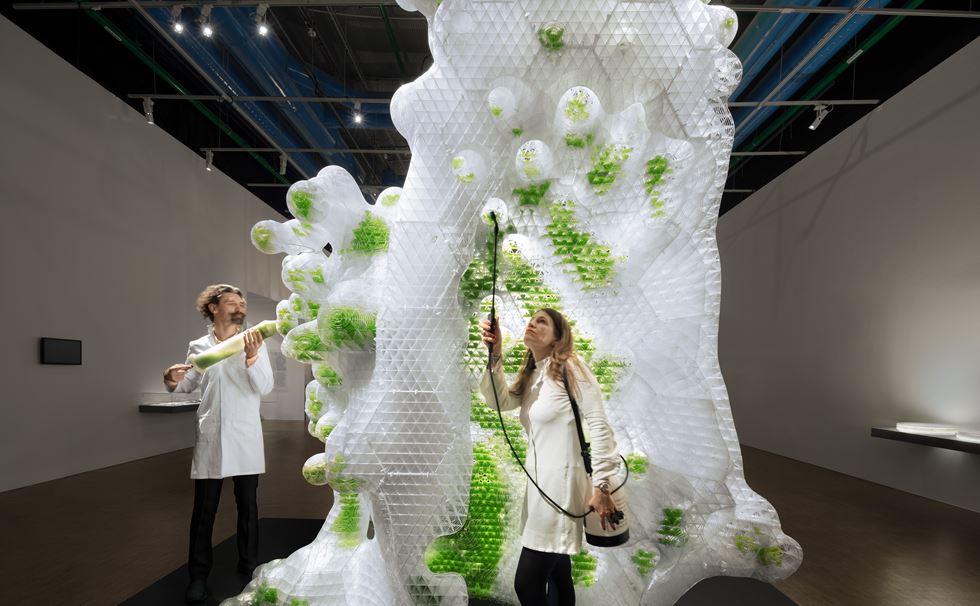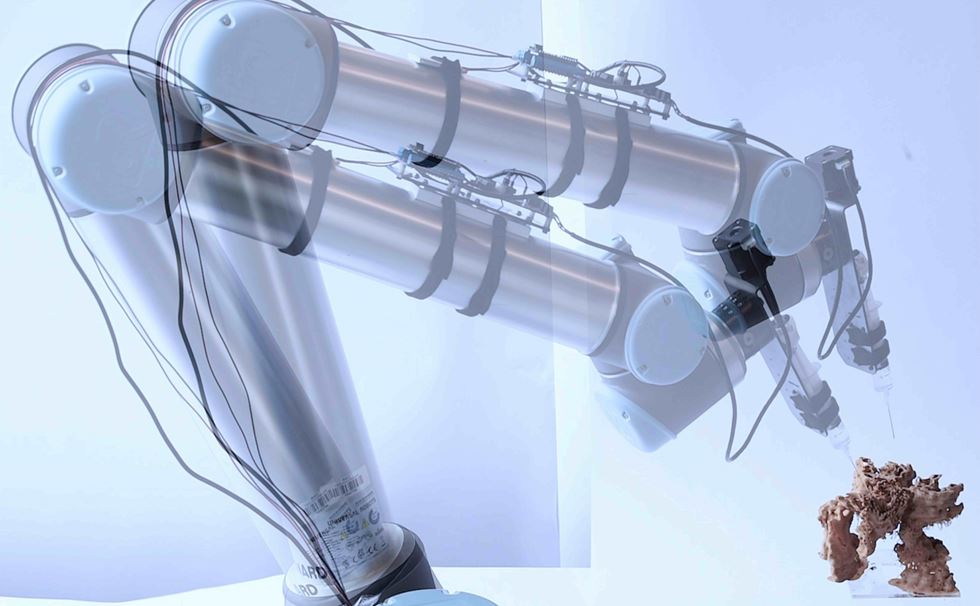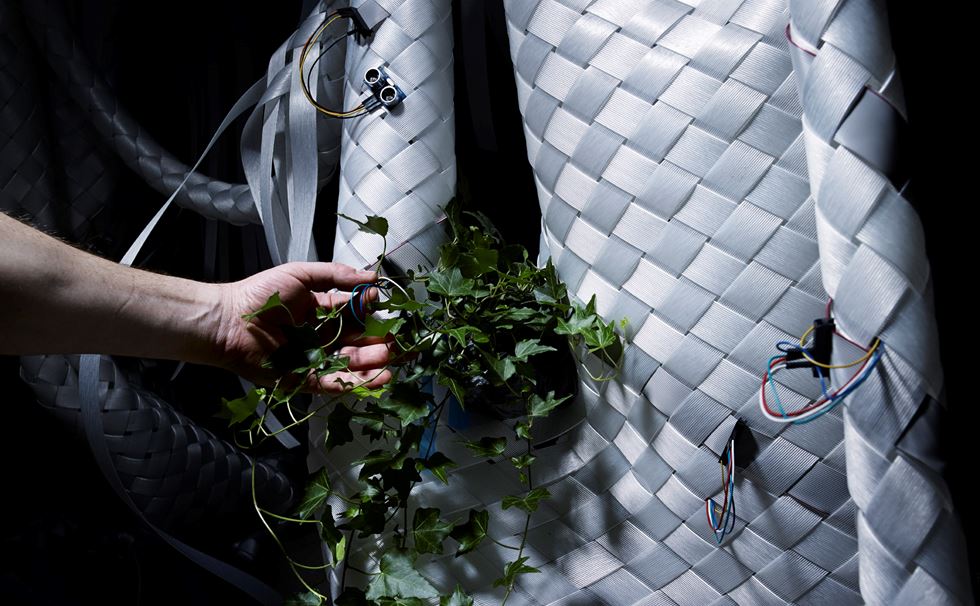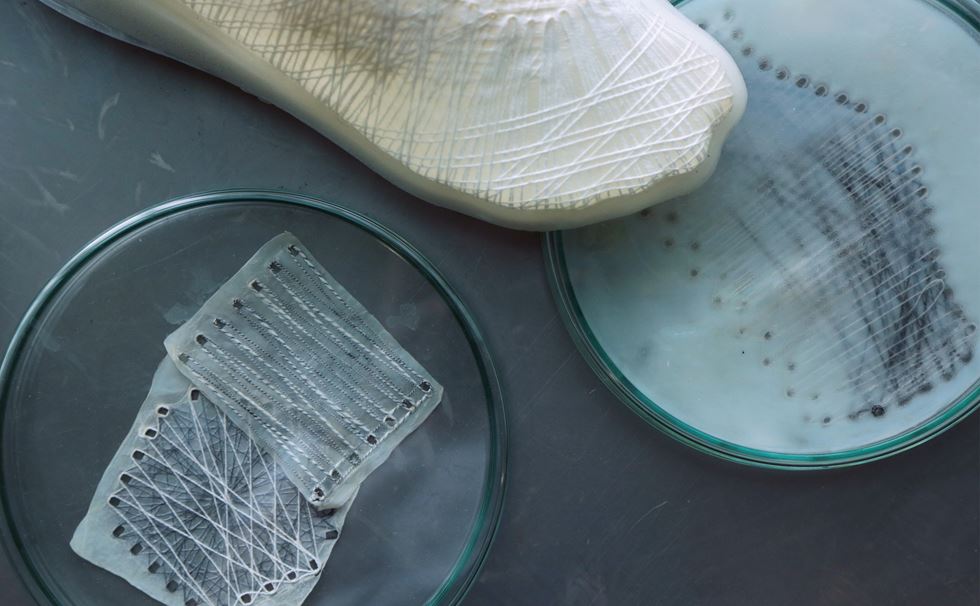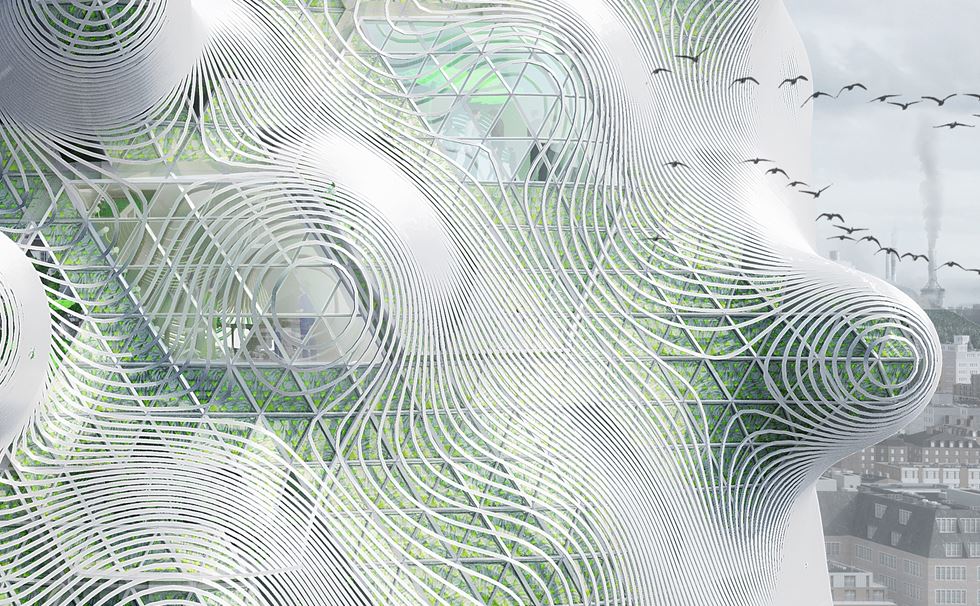Online event Book now
Design with the Living 2020
Join this two-part online symposium to explore how designing with living organisms can respond to today’s ecological challenges.
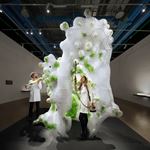

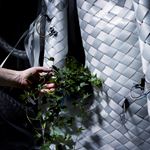
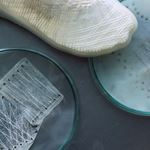

What to expect
'You never change things by fighting the existing reality. To change something, build a new model that makes the existing model obsolete.'- Buckminster Fuller
Can designing with living systems be the change we need in the context of today’s current environmental and ecological challenges?
In recent years, bio-design has emerged as an innovative new discipline that uses biological processes to create sustainable approaches to design, building and fabrication. From collaborating with living organisms such as mycelium to using artificial intelligence to guide the growth of plants, these designers and architects are exploring new ways to shape our material world in ways that are respectful of our planetary boundaries.
In this annual symposium, we are interested in exploring how this area of design is developing across global regions, and in critically discussing how it needs to evolve to address today’s environmental and ecological challenges.
Design with the Living aims to provide a space for critique and to drive an annual review of the agency of ‘design with the living’ in a global perspective. It is co-organised by the Design Museum, the Design & Living Systems Lab (Central Saint Martins UAL), The Bio ID Lab (Bartlett School of Architecture, UCL) and the British Council.
The Programme
This symposium will be structured around the following four sessions:
• Nature as partner: How can we transition to seeing nature as a partner, rather than a resource?
• Nature as system: What can we learn from plant systems?
• Nature as medium: How do you build using nature as a medium?
• Design as a host for growth: What are the new modes of cultivation for designing with life?
speakers
Jen Keane
Jen Keane is a designer, researcher and co-founder / CEO of Modern Synthesis, a biomaterial innovation company connecting the dots between design, biology and material science to develop radical and regenerative materials for the fashion industry.
Marcos Cruz
Marcos Cruz is an Architect and Co-Director of Bio-ID at UCL, a cross-disciplinary research platform between architecture and biochemical engineering. His varied academic activity has led to many publications and awards, including winning the acclaimed RIBA research award. His current research focuses on poikilohydric living walls and bioreceptive materials.
Phil Ayres
Phil Ayres is an architect, researcher and educator based at CITA, KADK, Denmark. His research focuses on the design and production of bio-hybrid architectural systems that couple technical & living complexes, together with the development of complimentary design environments. Phil has pursued this in the context of two EU funded projects: flora robotica and Fungal Architectures.
Yessica Méndez
Yessica Mendez is an architect, she holds a master in Advanced Architecture from IAAC. She is a researcher and the Academic Coordinator of the Architecture and Urban Strategies Department at CEDIM. Her research focuses on the integration of microorganisms, biomaterials and environmental performance in architecture through computational design and novel fabrication strategies.
Natalie Alima
Natalie Alimas’ PhD research focuses on real-time robotic feedback systems developed between industrial robots, biological materials and computational design. By establishing a direct dialogue between the digital and physical realms, data is extracted from the organism in order to generate algorithmic computational behaviours. This material centric design approach aims to create a new set of highly volatile and strange geometries which are fabricated in real time.
Jenny Molloy
Jenny Molloy is a Shuttleworth Fellow at the University of Cambridge where I build open source tools for distributed manufacturing of enzymes for biological research. I also co-founded three social enterprises and communities, working with collaborators in Africa, Latin America and beyond to build a open, sustainable and equitable global bioeconomy.
Jane Scott
Dr Jane Scott is the NUAcT Research Fellow at the Hub for Biotechnology in the Built Environment at Newcastle University. As a textile specialist her research challenges the established understanding of smart materials for architecture; applying principles derived from plant biology to the development of environmentally responsive textile systems composed of natural and sustainable materials.
Mitchell Joachim
Mitchell Joachim is Co-Founder of Terreform ONE and Associate Professor NYU. Formerly, he was an architect at Frank Gehry and I.M. Pei. He has been awarded a Fulbright Scholarship and fellowships with TED, Moshe Safdie, and Martin Society, MIT. He was chosen by Wired for "The Smart List” and selected by Rolling Stone for “The 100 People Who Are Changing America”.
Claudia Pasquero
Claudia Pasquero is an architect, curator, author and educator; her work and research operates at the intersection of biology, computation and design. She is founder and co- director of ecoLogicStudio in London, Lecturer and director of the Urban Morphogenesis Lab at the Bartlett UCL, Professor of Landscape Architecture and founder of the Synthetic Landscape Lab at Innsbruck University.
Paolo Bombelli
Paolo Bombelli is a joint research scientist in the Department of Biochemistry (University of Cambridge, UK) and Department of Environmental Science (University of Milan, Italy). His work focuses on the fundamental principles of photo-bio-electrochemistry with the aim to combine biology, engineering and design for translating the fundamental principles into practical applications.
Sheila Cooke
Sheila enables farmers to regenerate soils whilst attaining quality of life. As hub leader for 3LM, Land and Livestock Management for Life, and an Accredited Field Professional with the Savory Institute, Sheila is developing a network of Learning Hubs, Accredited Educators, and Ecological Outcome Verified producers of food and fibre.
Lucy Montgomery
Lucy is a Senior Consultant at NNFCC The Bioeconomy Consultants and has over 10 years’ research and consulting experience on industrial biotechnology and anaerobic digestion. She provides business support to innovators in the bioeconomy, de-risking their path to commercialisation with information on markets, feedstocks, technologies and regulations.
Naomi Nakayama
Naomi leads the Bio Form+Function Lab at Imperial College London. She studies thematic design features of living structures and their adaptability, mostly focusing on plant systems. The Lab uses fabrication and bio-fabrication (with synthetic biology) to explore the design space of biological forms and their functionalities.
Flora Girard
Flora Girard is a Trench PhD student in Bioprocess engineering at the University of Nantes, working at GEPEA, the Génie des Procédés Environnement Agroalimentaire laboratory. Her current research focuses on developing a Microalgae-based facade as a sustainable access to food, energy and water in urban centres.
Irene Agrivina Widyanigrum
Irene Agrivina Widyanigrum is an open systems advocate, technologist, artist, curator and educator. She is one of the founding members and current directors of HONF, the Yogyakarta based new media and technology laboratory. Irene runs HONF’s 'Education Focus Programme', which focuses on the application and practical use in daily life of collaborative, cross-disciplinary and technological actions responding to social, cultural and environmental challenges.
Nada Tarkhan
Nada Tarkhan is a Building Technology PhD student at MIT, working as a researcher in the Sustainable Design Lab. She holds a Masters in Design Studies form the Harvard Graduate School of Design, where she studied under the concentration of Energy and Environments. Her current research focuses on developing computational assessment models to test bioclimatic design strategies in the context of extreme climates and heat events.
Fernán Federici Noe
Fernán Federici Noe is Assistant Professor at Pontificia Universidad Católica de Chile and a research fellow at the OpenPlant Centre for Synthetic Biology at the University of Cambridge. He also works at iBio (Chile) and is a member of the TECNOx, ReClone and GOSH (Gathering for Open Science Hardware) communities, which promote open source technology in the region.
Emeka Okafor
Emeka Okafor is the Curator of TED Global in Africa, Co-Founder of the TED Fellows program and Maker Faire Africa, and author of the publicly acclaimed blogs, Timbuktu Chronicles and Africa Unchained. Okafor recently co-founded KICHIN, a West African food & beverage accelerator aimed at rapidly scaling existing food entrepreneurs with high-growth potential.
Related exhibition
Background image | Yessica Mendez.Bio-activated ceramic column in urban context_Bio-active ceramics. Courtesy of Grecia Cortés.
